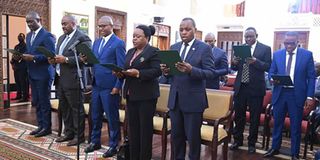Prime
System of hiring parastatal heads comes under scrutiny

Newly appointed officials take the public service oath of integrity at State House in Dar es Salaam on Tuesday. PHOTO | STATE HOUSE
What you need to know:
- Recent blunders in the process of appointing heads of State-owned enterprises have put the current system firmly under the spotlight, with some observers calling for hiring to be overseen by an independent body
Dar es Salaam. The power to appoint the heads and board chairs of parastatals in Tanzania has come under scrutiny.
This follows recent events that saw blunders in the appointment process, with the President admitting that there is a missing link in imparting information to the President’s Office on parastatal performance.
But even as President Samia Suluhu Hassan grapples with tracking parastatal performance, she has full powers under the Constitution to hire and fire parastatal chiefs.
Article 36(1) of the Constitution of the United Republic of Tanzania gives the President the authority to constitute and abolish any office in the service of the government of the United Republic.
Article 36(2) states that the President shall have the authority to appoint persons to hold positions of leadership responsible for formulating policies for departments and institutions of the government and chief executives who are responsible for supervision of the implementation of those departments’ and institutions’ policies in the service of the Government of the United Republic.
However, experts have said there is a need for an independent body with the responsibility of overseeing the process of selecting heads of State-owned enterprises (SOEs) in order to lessen the burden on the President’s shoulders and also ensure checks and balances for these critical roles.
According to them, the government body that scrutinises and conducts vetting for presidential appointments needs to be independent as well as specialised in various fields to be able to recognise candidates who are experts and well-equipped for their positions.
These concerns were compounded by confusion last week when former Tanzania Electric Supply Company (Tanesco) managing director Maharage Chande was transferred from the utility to serve as director general of telecom firm TTCL and two days later was appointed Postmaster General.
Currently, according to the law, the President appoints ministers, permanent secretaries, board chairs and heads of SOEs.
Associate Professor of Development Economics at the University of Dar es Salaam Abel Kinyondo said the existing body has been in operation since independence and is too general in its vetting process, which is why mistakes have been made from time to time.
“We need an independent body that is specialised in various fields such as energy, infrastructure and health, among others, to be able to pick the right candidates,” he said.
Dr Kinyondo noted that the minister, permanent secretary, board chair and director general of an SOE are all appointed by the President, with the minister only appointing board members.
According to him, the responsibility of picking such a large number of government officials is “huge”.
Dr Kinyondo noted that, in one way or another, all presidential appointees will be focused on pleasing the appointing authority instead of being held accountable for their core roles.
According to him, in other countries, even ministers appointed by the President must be endorsed by parliament.
Dr Kinyondo said the proper procedure is for candidates to apply for posts of director general and be appointed on merit to ensure more accountability, adding that the vetting process should be part and parcel of the selection procedure.
“If we take the case of Tanesco, former Energy minister January Makamba at one time worked at State House, while the board chair of the power utility firm also worked at State House for the President’s Result Bureau (Big Results Now), with Tanesco DG also being a member of the Bureau. Therefore, they were acquaintances who maybe could not make difficult decisions against each other,” he said.
Echoing similar sentiments, ACT-Wazalendo party leader Zitto Kabwe said he does not support the current arrangement where chairpersons of boards of SOEs are appointed by the President, while board members are appointed by ministers.
He noted that parastatal heads are also appointed by the President, a situation that creates battles for supremacy pitting individuals appointed by the same authority.
“The best practice should have been for chief executives to be appointed by boards instead of being picked by the same appointing authority,” Mr Kabwe said, adding that the President should be left with the responsibility of appointing board chairpersons after a competitive process, while the appointment of CEOs should be the responsibility of boards.
Meanwhile, Prof Mohammed Bakari of the University of Dar es Salaam said there is no problem with the appointments.
However, he said the question should be whether appointments are political of if they consider professionalism as the overriding criterion.
“We need to pick a leaf of inspiration from Kenya, which has a commission that endorses top government officials after thorough vetting to ensure that professionalism is safeguarded. This will help the President, who has to oversee many things,” Prof Bakari said.
An independent lawyer based in Dar es Salaam proposed amendment of the Constitution, saying it gives the President excessive powers, which have exposed major loopholes in checks and balances, including the selection of the right candidates.




